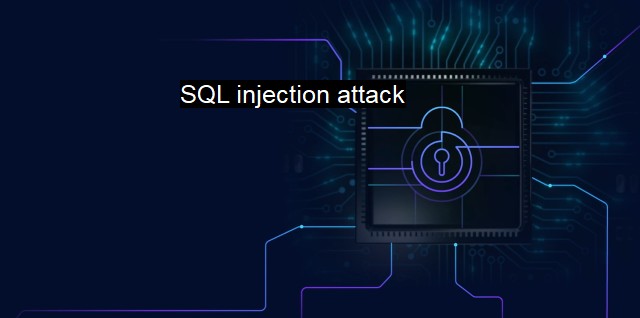What is SQL injection attack?
The Rising Threat of SQL Injection Attacks: Risks, Impacts, and Precautionary Measures for Computer Systems
SQL injection attack is a cybersecurity term related to web applications security vulnerabilities. It is a code injection technique that hackers use to attack data-driven applications. The SQL injection method involves inserting malicious SQL code into a query via client-side input. The success of an SQL injection attack can range from minor, such as illegal viewing of data, to significant, affecting the integrity and availability of data.To understand what an SQL injection attack is, we must first understand what SQL is. SQL (“Structured Query Language”) is a standard language for database management and is used in organizing, managing, and retrieving data stored in a relational database. SQL communicates with databases and performs various tasks like updating data on a database or retrieving data from a database.
SQL injection (SQLI) attack happens when an attacker exploits a security vulnerability happening in the database layer of an application. Secure data is the essence of any organization, and when a loophole in the security system is abused, organizations face the risk of different hazards, financial loss being one.
In an SQL injection attack, a malicious actor uses the vulnerability and sends dubious SQL code that runs on the database. The attacker masquerades as a trustworthy entity and exploits system vulnerabilities to retrieve sensitive information from a system. The attacked system ends up divulging information that should have been confidential, leading to the compromise of the system.
Hackers can use this technique in different ways. For instance, they can access, modify and delete information from databases. Essentailly, they can perform any action that a typical application user with administrative privileges can perform.
An SQL injection can have severe consequences. In the worst-case scenarios, attackers could delete entire tables or leak sensitive user data like passwords and personal information. This opens the door for other types of attacks, such as identity theft. At the same time, organizations can sustain immense reputational damage, along with potential legal consequences for failing to adequately protect user data.
Therefore, protection against SQL injection attacks is crucial. The first line of defense against these kinds of attacks is the use of parameterized queries, also known as prepared statements. This method controls and restricts the data that could be inserted in a database, mitigating the chances of harmful commands being executed.
Regular database software patching and updates is an excellent measure for preventing these attacks. Often, software providers release patches that contain fixes for the different known vulnerabilities that could be exploited through SQL injection.
Firewall and antivirus technologies can be used to thwart SQLi attacks, although they are not entirely foolproof. by blocking known malicious IPs, limiting server exposure to the internet, running services with minimal privileges, and limiting the application's ability to execute certain actions, an extra layer of protection can be added.
Equally important is to educate developers about secure coding practices to avoid such vulnerabilities in the first place. Regular code audits, vulnerability scanning, and penetration testing should also be carried out to ensure the security of the application.
An SQL injection attack is a serious cybersecurity breach since an infiltrator can gain unauthorized access to confidential data, thereby causing unparalleled damage to the organization's reputation and finances. Protection measures like the use of parameterized queries, recent updates, sophisticated firewalls, and antivirus, coupled with proactive measures like enhanced secure coding standards, regular code auditing, and vulnerability scanning, are necessary to protect against potential SQL injection attacks.

SQL injection attack FAQs
What is a SQL injection attack?
A SQL injection attack is a type of cyber attack that targets web applications and vulnerabilities in the SQL database. The attacker uses SQL commands to manipulate the database and gain unauthorized access to sensitive information such as passwords, credit card numbers, or personal data.How does a SQL injection attack work?
A SQL injection attack works by manipulating the input fields of a web application to execute malicious SQL commands. The attacker sends input that is deliberately designed to be interpreted as SQL code instead of regular data. This code then modifies the backend database and grants the attacker access to sensitive information or the ability to execute further attacks.What are the consequences of a SQL injection attack?
A SQL injection attack can have serious consequences for organizations and individuals. It can result in the theft of sensitive information, financial losses, reputational damage, and legal liabilities. Additionally, a successful attack can compromise the security of the entire IT infrastructure and expose it to further vulnerabilities.How can I protect myself against SQL injection attacks?
To protect yourself against SQL injection attacks, make sure to use secure coding practices and input validation techniques. This includes using parameterized queries, sanitizing user input, and limiting the privileges of database users. Additionally, keeping software and security systems up-to-date, monitoring for unusual activity, and conducting regular security audits can help detect and prevent SQL injection attacks.| | A | | | B | | | C | | | D | | | E | | | F | | | G | | | H | | | I | | | J | | | K | | | L | | | M | |
| | N | | | O | | | P | | | Q | | | R | | | S | | | T | | | U | | | V | | | W | | | X | | | Y | | | Z | |
| | 1 | | | 2 | | | 3 | | | 4 | | | 7 | | | 8 | | |||||||